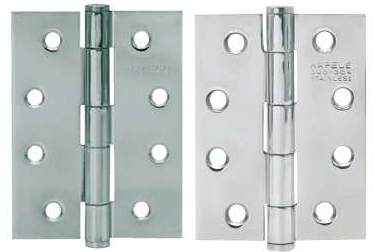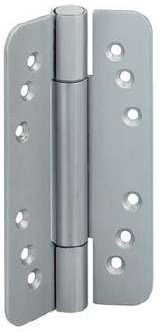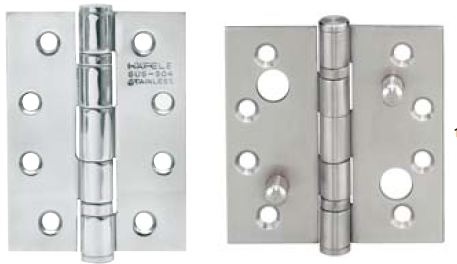 |
|||||||||
Graphical Construction Glossary >> Doors. >> Door Hinges >> Butt Hinge
All the hinges on this page are classed as mortise hinges. That is they sit in recesses in the timber door and frame. They are edge-fixed to the door and jamb. This is the normal way of achieving a neat and tradesman like job, but depending on circumstances they can be face fixed, or recessed at the door only. This occurs quite a lot when fixing to metal jambs. However there is a different category altogether for this work of fixing metal to metal or metal to wood See Non-Mortised Hinges.
Above are two typical butt-hinges used in their hundreds of thousands for fixing standard doors.
Smaller versions of these hinges are available for fixing lighter doors to cupboards etc. It used to be common to see 75mm high hinges used on internal residential doors, but they are not specified these days. The cost saving is negligible if any, so 100mm high is now a universal hinge size for standard house and commercial doors. The on the right shows a hinge that is a step up in quality.
If you didn't find exactly what you are looking for try this search tool that will search the site and the web. "What can be added to the happiness of a man who is in health, out of debt, and has a clear conscience? "When we build, let us think that we build for ever."John Ruskin 1819-1900 |
Hire Equipment  Furniture Fittings - Architectural Hardware - Electronic Locking Systems - Technical Hardware BuilderBill sponsorship Glossary Pages.Roof Glossary and Roofing Formwork Glossary and other tempory work. Hand Tools Glossary Power Tools Glossary Asbestos Glossary Woodwork Glossary Stair Glossary Concrete Glossary Masonry Glossary doors Glossary BuilderBill Books Building Maths  Stair Design  Asbestos Book |
||||||||
|
|
|||||||||
|
Please Note! The information on this site is offered as a guide only! When we are talking about areas where building regulations or safety regulations could exist,the information here could be wrong for your area. It could be out of date! Regulations breed faster than rabbits! You must check your own local conditions. Copyright © Bill Bradley 2007-2012. All rights reserved. |
|||||||||


